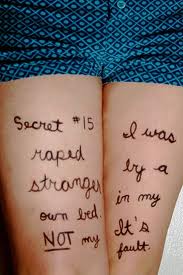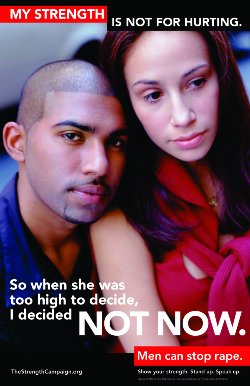
From celebrities to average individuals, friends to family members, sexual abuse and domestic violence have scarred the lives of thousands across the world. Many victims are forever silenced while some find the voice within them to speak up.
Take Back the Night, hosted by CUNY Lehman College in the Bronx, New York on Tuesday, April 24 served to support survivors, console them as they heal as well as bring awareness to students.
After
introductory remarks by a campus counselor Nicole Madonna Rosario and Lehman's
vice president Jose Magdeleno and Dean John Holloway, attendees were reeled
into the program with a student theatrical production called "The Witness." It was
written by Andre Bell and performed and directed by Lehman students.
"Even if one person leaves helped, that's what's important," said Rosario, who was part of the planning committee for this year's event. "Over time, I want this event to change the culture of our section of the world so [sexual abuse and domestic violence] becomes a conversation and less of a stigma. It's like setting up the game of dominoes, but sometimes you have to set it up for a while so that it flows."
Take Back the Night is an international function that aims to unify women, men and children who are victims of various forms of violence.
The
first documented Take Back the Night event was executed in 1975 in Philadelphia,
Pennsylvania after a woman was stabbed by a stranger while walking home alone.
Since then, the movement has sparked interest in family and friends of victims
and survivors across the U.S and Europe.
In 2001, Katie Koestner founded the international
headquarters and charitable 501(c)3 for Take
Back the Night along with others who are passionate about the mission of the
foundation.
 According
to a 2006-2010 national crime victimization survey conducted by the U.S
Department of Justice, 54 percent of rapes and sexual assaults were unreported
with an average 207,754 victims of 12 years or older annually.
According
to a 2006-2010 national crime victimization survey conducted by the U.S
Department of Justice, 54 percent of rapes and sexual assaults were unreported
with an average 207,754 victims of 12 years or older annually.
Despite
such enormous figures, some victims haven't allowed the statistics to silence
them.
Sheena
Lashay, a product of date rape and survivor of childhood sexual abuse, reported
her incident to the police. She was victimized by her now ex step-father, a
community and church leader, beginning at age 7 until age 14. Her church and
various family members knew about the abuse and all urged her to keep quiet.
Raised as a conservative evangelical yet also a non-denominational fundamentalist Christian in what
she describes as a cult-like church, Lashay was told by church leaders that she
would be hell-bound if
she uttered a word.
"He
didn't serve a day in prison," said Lashay, emphasizing that the case file was mysteriously misplaced even after her perpetrator
confessed. "He's actually a current church leader and teaches teenagers on
sexuality. Interesting."
Interesting
indeed and quite disturbing. The result of his charge is not unfamiliar,
however, as 97 percent of rapists
are not incarcerated.
Sexual
abuse is not just a "Catholic
problem" - as some have coined it - or
an epidemic that plagues the "immoral" non-believers.
There are leaders of various faith communities
who stand before their assemblies
every week and are still not
convicted by their wrongdoings.
The Survivors Network of those Abused by Priests
(SNAP), a national, self-help organization of victims of sexual abuse by clergy
affirms just that. Baptist Outreach Director of the program, Christa Brown, was
also victimized by her youth leader at a
Southern Baptist church.
 Although
Lashay currently lives a fulfilling life--as a writer, blogger,
YouTuber,
and spokesperson for the Rape Abuse & Incest National Network (RAINN) among
other endeavors--Lashay confessed that it was not always that way. In her My
name is...Sheena Lashay video, which has over 2,000 views, she shares excerpts of her journal depicting her anger, confusion and bout with suicide because of
her dark memories.
Although
Lashay currently lives a fulfilling life--as a writer, blogger,
YouTuber,
and spokesperson for the Rape Abuse & Incest National Network (RAINN) among
other endeavors--Lashay confessed that it was not always that way. In her My
name is...Sheena Lashay video, which has over 2,000 views, she shares excerpts of her journal depicting her anger, confusion and bout with suicide because of
her dark memories.
The
other two speakers present at the event knew exactly what it was like to want to turn to suicide when all else seemed to fail. Andrew
Willis and Ralph Castro, both spoke of their encounter with death.
" ...last year I swallowed three hundred Tylenol PMs. I was unconscious for five days," said Willis when asked how he deals with people giving him a time limit for getting over his abuse. "When you're trying to kill yourself you're trying to do so for a reason, it's because you have no value left to your life."
Willis, a native of Hong Kong, China is also a child sexual abuse survivor as well as a domestic violence survivor. Now in his mid-40s, Willis has been bombarded occasionally by friends and his parents about his investing so much time and money in stopping sexual abuse and domestic violence. He is currently the CEO of Stop Abuse Campaign, a movement which aims to stop sexual, physical and emotional abuse.
"Now that I've found something that keeps me alive you'd think that you'd support me rather than questioning why I'm doing it, that just seems more productive to me," said Willis, critical of his family's position.
According
to the National Institute of Justice and Centers for Disease Control &
Prevention, 2.78 million men have been victims of sexual assault and rape in
the U.S alone.
For
years, society displayed the silhouettes of women as the targets for sexual
abuse and domestic violence, yet some people are astonished to discover that
males are victimized, as well. Sexual abuse and domestic violence does not have
distinct prey. Women, men, children, elderly, hetero/homosexual, Black, White, Hispanic,
European--no one is exempt from the attacks.
The stigma that has been promoted
for years is the notion that men should never be vulnerable; they should not
cry, be weak or fearful in any circumstance.
"If I can make you cry, then I can make you talk," said Alan Fuentes, an advisor at Lehman's Career Services during the Remember the Night meet up on Wednesday, April 25.
 Men
are supposed to be powerful leaders, independent, strong and self reliable.
That's the standard that has been set and adhered to by many. It is also the
very standard that has sparked violence and abuse due to the lack of filters
available to men.
Men
are supposed to be powerful leaders, independent, strong and self reliable.
That's the standard that has been set and adhered to by many. It is also the
very standard that has sparked violence and abuse due to the lack of filters
available to men.
"Power is taken away from you and you learn that love equals sex and power equals violence," said Ralph Castro, a native of Bronx, New York, holding back tears. "How do I get that power back and what are the consequences that come with regaining that power?"
Due to the abuse
at home, Castro went from a college-bound student to a troubled kid who dropped
out of school. He joined a gang and, while living on the streets, became
addicted to cocaine and then crack cocaine, which led to stealing to support
his habit. He pushed away his loved ones and got violent with his girlfriend
who wanted to help him. He lived a destructive lifestyle and contemplated
suicide.
Arrested for assault with a deadly
weapon and some petty larceny charges, he did years of probation and community
service. About five years ago, he began the process of healing.
Lehman's
Take Back the Night event was Castro's first time speaking publicly about his childhood sexual abuse. It's a secret
that he has kept into his mid-40s.
The statute of limitations in New York for child sex abuse is five years after it is reported to police or five years after the victim turns 18. In recent years, however, many have been pushing for an extension in the law.
If the limitation is extended, survivors would be able to report their crimes into their elderly age. In Pennsylvania, the criminal statute of limitations extends until the victim is 50 years old with child sex abuse victims filing suit before they turn 30.
Many
protest, however, that the victim's memory becomes unreliable with the passing
of time and evidence may become insufficient if not stored appropriately.
Through poetry, which was suggested
by Castro's therapist, he was able to relieve himself of the some of the
tension, grief and anger brought on by his trauma.
Here is an excerpt from Ralph Castro's poem Darkness consumes the light:
Out of a blissful, deep slumber I am stirred
visions of toys and childish things now blurred
through wispy, sleepy, innocent eyes I see
a grown, naked man standing infront of me
As I wipe hours of cake sleep,
now mingled with warm tears
warm tears once dry, I start to question why?
a childhood erased in a blink of an eye, why?
Just call out, my soul shouts in vain
Open your mouth and tell of this thing
the harder I try... the voice stayed silent within
You want me to do what?!
As if in a trance I moved behind a naked man,
facing his backside
I hear a noise, Lord I hear a noise
...confusion as my mind starts to reel,
Overloaded by all the sensations I feel...
Castro
is committed to healing and stopping abuse.
 "I'm working on finding my own voice and helping others find their voice," he said.
"That's where the healing begins. I try to see the silver lining in things that
happen to me and try to turn it around."
"I'm working on finding my own voice and helping others find their voice," he said.
"That's where the healing begins. I try to see the silver lining in things that
happen to me and try to turn it around."
All the speakers reflect the notion of influencing other survivors to be bold about using their voices.
"Even if you never knew anything about me," said Lashay. "I'd hope that if you ever have a conversation with me, or read my blog, or I tweeted you, you'd leave that conversation feeling empowered or feeling the comfort of expressing exactly who you are."
As the event concluded, the step team performed then students marched around the campus quad, holding a candlelight vigil. They carried and read aloud words on poster boards created by Lehman's Freshman Year Initiative (FYI) students. Guests were invited to share a poem or a personal story doing the open mic portion, which also featured a short skit. Guests received a t-shirt in honor of the event, along with an alert whistle and ribbons in honor of the day.
Organizations
such as Safe Horizon, RAINN and Men Can Stop Rape among others are
available to assist victims and survivors of abuse.

